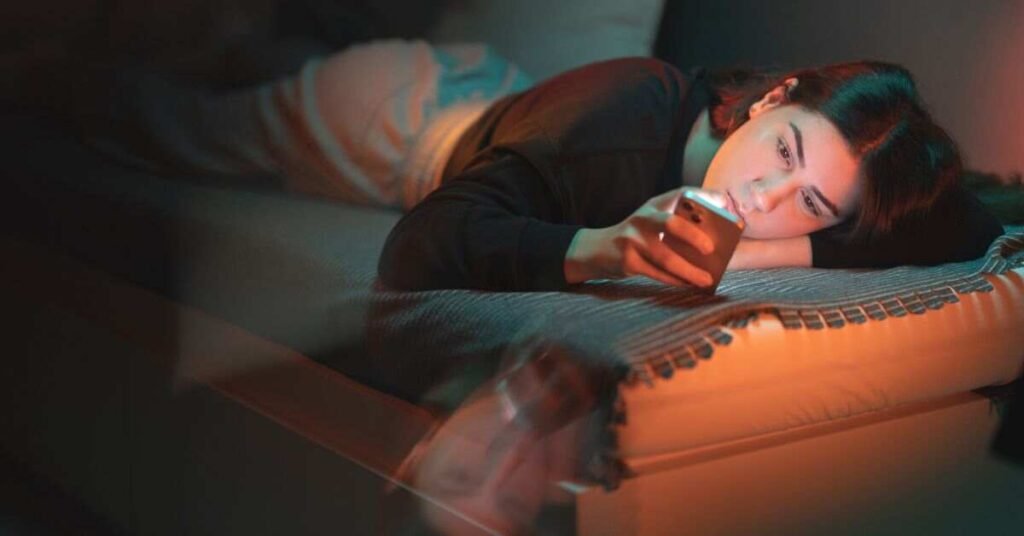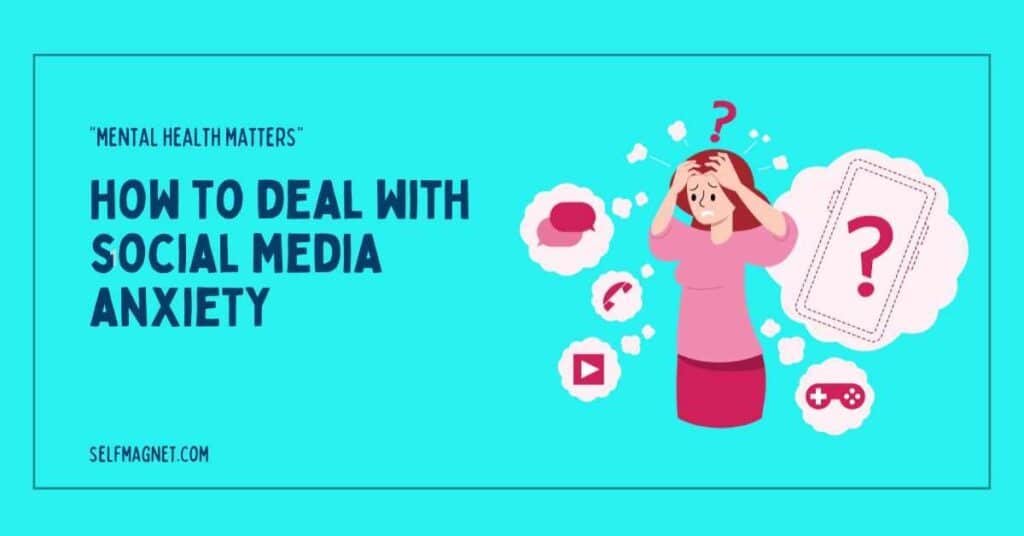Conforming to societal standards can be stressful and overwhelming in a world where reviews, likes, and reposts rule. But fear not; how to deal with social media anxiety head-on is the first step toward a healthier online experience.
In this guide, we will explore social media anxiety signs and their influence on mental well-being and offer practical coping methods.
Understanding Social Media Anxiety

Social media anxiety is people’s discomfort when using or thinking about social media. It can appear in different forms, such as comparison, FOMO, or online approval stress.
Common Signs and Symptoms of Social Media Anxiety
Signs and symptoms of social media anxiety may include:
- Regularly checking and scrolling through social media.
- Feeling inadequate or envious upon viewing others’ posts.
- Neglecting important tasks and obligations because of excessive use of social media.
- Feeling anxious about sharing content and worrying about negative feedback.
- Fear of being judged or ridiculed online.
- Anxious about not keeping up with important events or trends.
- Feeling uneasy when unable to access social media.
- Consistently modify or erase posts because of dissatisfaction.
- Heightened irritability or mood swings.
- Difficulty concentrating on other things.
- Sleep disturbances from late-night scrolling or blue light.
Impact on Mental Health and Well-being
The pressure for an idealized online life affects mental health.
Studies have shown that extreme use of social networking sites is linked to anxiety, depression, and other wellness issues.
- According to a survey by the American Psychiatric Association, 68% of adults feel stressed by the constant stream of information from the internet.
- Statistics reveal that 91% of 16-24-year-olds using social media are linked to increased rates of anxiety and depression.
- An advisory suggest Spending more than 3 hours on social media daily is associated with high psychiatric distress levels (Surgeon General Issues New Advisory About Effects Social Media Use Has on Youth Mental Health)
The following sections will explore the reasons for online social stress.
Identifying Triggers of Social Media Anxiety
Digital overwhelm often arises from specific activators that vary from person to person. Identifying these common triggers helps in developing a stress-handling approach.
The Comparison Trap
Have you ever scrolled through someone’s polished highlight reel and felt your life doesn’t measure up? You’re not alone.
Internet forums rely on portraying our best selves, distorting reality and giving the impression that everyone has organized lives.
The never-ending stream of “perfect” lives intensifies comparisons, contributing to feelings of failure and lowered self-esteem.
Social comparison theory clarifies our natural tendency to evaluate ourselves against others.
However, we’re comparing carefully curated snapshots to our unfiltered realities on digital platforms. It sets ourselves up for unfair competition.
Additionally, the algorithm-driven nature of these platforms often exposes us to content that strengthens our insecurities, creating a negative feedback loop. We start doubting our achievements.
The Negativity Bias
Our brains naturally respond to negative details, and digital platforms capitalize on this by promoting negativity and conflict. It conditions our mood and outlook.
Online anonymity can encourage cyberbullying and harassment, adding to the anxiety-inducing atmosphere.
Cyberbullying
Cyberbullying is when people use online platforms or messaging to bully or hurt others. This can manifest as hurtful messages, negative interactions, rumors, exclusion, impersonation, and the disclosure of private details.
The effects of cyberbullying can be severe, resulting in emotional distress, anxiety, and even more serious consequences like depression or self-harm.
Preventing cyberbullying requires education, awareness, and policies.
Information Overload
Information overload is an overwhelming amount of data that is difficult to process and manage. The internet and digital tools afford people unparalleled access to data.
While beneficial, this vast amount of data can overwhelm, cause stress, and cause decision-making difficulties. It harms productivity, mindset, and vigor.
A healthy balance and mindful facts consumption are important in the digital age. Sorting and organizing content help manage information.
The Fear of Missing Out (FOMO)
The Fear of Missing Out (FOMO) is a common social anxiety where one fears missing out on rewarding experiences or opportunities others are having.
FOMO thrives on the illusion that others have fascinating and fulfilling lives. Virtual channels only show the exciting, not the mundane.
People may feel compelled to stay connected online and attend events to avoid feeling left out. It leads to increased anxiety, checking, and self-doubt.
The Constant Performance Pressure
The demand for a flawless online image can affect one’s emotions.
The fear of negative feedback or criticism generates intense anxiety. Online personas take precedence over real-life connections.
Understanding triggers helps develop coping mechanisms for social media anxiety and create a more positive online experience.
Stay tuned for practical strategies for reclaiming online peace.
How to Deal with Social Media Anxiety: Developing Your Coping Mechanisms

You’re not just another scroll in the algorithm; you have the power to reclaim your online experience and cultivate a thriving digital presence. Let’s discuss effective coping strategies.
Unplug to Reconnect
Set and follow a schedule for web-based communities. Regulate screen time and create tech-free areas.
Manage check-ins and resist the urge to refresh your feed constantly. Avoid mindless scrolling to check notifications.
Use apps or browser extensions to block access during off-hours. The digital world can wait; mental health matters.
Curate Your Digital Sanctuary
Treat your online accounts as personal spaces. Do they convey positivity or worsen pessimism? Unfollow accounts that trigger negativity or promote unrealistic expectations.
Sometimes you need to distance yourself.
Customize your feed with uplifting content. Your inner peace is more important than online approval.
Engage Meaningfully
Join conversations, share valuable insights, and foster genuine connections, making virtual engagement meaningful.
It’s more than just user participation. It’s about creating a community where ideas bloom, and relationships flourish.
Break the Comparison Cycle
Social media is a feature reel, not the complete narrative. Don’t compare your reality to someone else’s perfection. Everyone’s journey is unique. Channel your energy into self-improvement, not comparing to others.
Celebrate all your achievements, big and small.
Accept flaws in yourself and others. Authenticity is the antidote to anxiety.
Prefer real-life connections
Make time for activities and interactions with loved ones in the real world. Social connection is essential for happiness, with real-life moments offering deeper connections.
Related posts:
What You Fear is What You Attract: A Deep Dive
How to Reprogram Your Subconscious Mind to Manifest Your Dreams
Exploring Offline Hobbies
Designate specific days for a digital detox and pursue activities you enjoy. Disconnect to rediscover yourself and your passions.
Take breaks to restore inner balance and emotional energy.
The Power of Unplanned Moments
In the quest for excellence, we often forget the beauty of spontaneity. Ask yourself: When did you last embrace an unplanned moment without the urge to document it?
Enjoy the freedom of living in the present. Not every experience needs a digital footprint.
Build a support circle
Choose a company of inspiring people who uplift and back you. Seeking support is not a token of weakness. Share your struggles and seek encouragement from those who understand.
Practice Self-Compassion and Gratitude Exercises
Challenge and replace negative self-talk with self-worth affirmations.
Appreciate things you’re grateful for, big or small. Journaling or sharing gratitude with friends boosts mood and combats despair.
Deep Breathing
Deep, rhythmic breathing exercises can help soothe the nervous system and initiate relaxation responses when feeling overwhelmed.
Meditation
Take a few minutes daily to settle your mind and notice your thoughts and feelings without judgment. Apps such as Headspace and Calm provide guided meditation sessions.
Don’t forget that cultivating resilience demands patience and dedication. With the right tools and a shift in perspective, you can create a positive and anxiety-free relationship with social media.
Conclusion
Social media anxiety manifests in various forms. Its impact on mental health is significant, with studies linking excessive use to anxiety and depression.
Triggers include the comparison trap, negativity bias, cyberbullying, information overload, FOMO, and constant performance pressure. Identifying these triggers is key to developing coping mechanisms.
Practical strategies include:
- Unplugging to reconnect.
- Curating a positive online environment.
- Meaningful engagement.
- Breaking the comparison cycle.
- Celebrating achievements.
- Fostering real-life connections.
Offline hobbies, embracing unplanned moments, building a support circle, practicing self-compassion, gratitude exercises, deep breathing, and meditation help dealing social media anxiety.
In conclusion, applying the right techniques and adjusting your viewpoint favor a healthy relationship with social media.